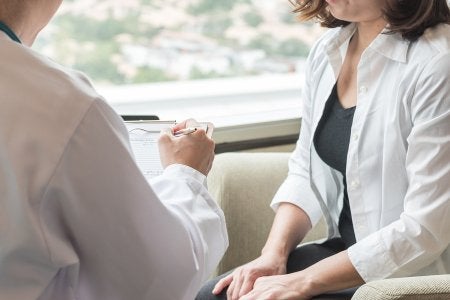-
What Causes Genital Warts?
Genital warts are an extremely common STD. The human papilloma virus, or HPV, causes them. There are many strains of HPV, and the strain that you have determines the kinds of symptoms you will experience and the kinds of complications that could potentially occur. If you suspect that you could have genital warts, then see your gynecologist for an accurate diagnosis and HPV treatment.

Genital warts sometimes appear as bumps or clusters of bumps in the genital region, though sometimes the bumps are not visible. In addition to the appearance of warts, people with HPV may experience itching, bleeding, burning pain, and vaginal discharge. Some forms of HPV also increase the risk of cervical cancer, so if you are diagnosed, your gynecologist may recommend more frequent Pap tests.
Washington Surgi-Clinic offers confidential STD testing in Washington, D.C., as well as a range of other women’s health services. To make an appointment for STD testing or treatment, Pap smears, and other gynecology services , please call (202) 659-9403.
-
A Look at the History of Birth Control
The strive for effective birth control started in ancient times, when women would mix up different concoctions that they believed would stop them from becoming pregnant. The forward progress to the multiple forms of birth control available today is a relatively new phenomenon, and many women still don’t have access to safe and effective contraceptives.
Watch this video to learn more about this history of birth control. The birth control pill was introduced in 1960 and was a turning point for women. However, many women still struggle with a lack of reproductive rights, in the US and around the world.
At Washington Surgi-Clinic , our gynecologists are committed to helping women take charge of their rights by providing access to multiple methods of birth control and access to pregnancy termination. Make an appointment with a gynecologist in Washington, D.C. by calling (202) 659-9403.
-
Understanding the Causes of Heavy Periods
Heavy periods—also called menorrhagia—can have significant impacts on your quality of life. In some cases, they can also lead to health problems, such as anemia. Having persistently heavy periods is not something that you simply have to accept. Your gynecologist can help you pinpoint the cause and determine treatments that can help make your period more manageable. Here are some of the most common causes of heavy periods.
Endometriosis
Endometriosis is a condition in which the tissue that lines the uterus also grows outside the uterus. The tissue responds to hormonal fluctuations as the same way whether it is inside or outside, of the uterus, so it bleeds during menstruation. This can cause excessive bleeding as well as pain and severe abdominal cramping. There are treatments that can help manage the symptoms of endometriosis, so see your gynecologist to see if it could be affecting you.

Uterine Fibroids
Uterine fibroids are noncancerous growths that appear along the lining of the uterus. Doctors don’t know why uterine fibroids appear, but they may be linked to hormones, growth factors, and genetic changes. Heavy periods are a classic symptom of fibroids. Polyps, another kind of growth, can also cause heavy bleeding when they appear in the uterus. Medications and a range of minimally invasive procedures can treat uterine fibroids and polyps.
Non-Hormonal IUDs
IUDs are a popular form of birth control, but some women find that the non-hormonal versions lead to heavier periods. Not all women react this way to non-hormonal IUDs, but if your heavy periods started after getting one, it could be the cause. Your gynecologist can help you determine if your IUD is causing heavy periods and if another kind of birth control could be better suited to your needs.
Washington Surgi-Clinic offers complete gynecology services , ranging from STD testing and treatment to period and birth control management. To make an appointment with a gynecologist in Washington, D.C., please call (202) 659-9403.
-
Caring for Yourself After an Abortion
After an abortion, it is important to get adequate rest and follow-up care to ensure a healthy, fast recovery. Your gynecologist will provide you with extensive information about caring for yourself after a pregnancy termination . This information will also help.

Plan to Rest
Ideally, you should allow yourself a few days to simply rest after your abortion. During this time, you may experience heavy to light bleeding, as well as nausea, cramps, and breast tenderness, which can last for a few days to a few weeks. It’s common for symptoms, especially bleeding, to start and stop a few times before ending for good. You should avoid strenuous activity for the first few days after your procedure, and avoid sexual intercourse, tampon use, or douching to five days. If it’s not possible to take time off of work and school, listen to your body and take things as easy as you can.
Attend Follow-Up Appointments
You will likely need a follow-up visit with your gynecologist to ensure that the abortion was successful and that you are recovering without complications. These appointments are important to your health, so be sure to attend any follow-ups recommended by your gynecologist. If you experience any signs of complications before or active your follow-up, call your gynecologist right away.
Pay Attention to Your Emotions
Women often feel a range of emotions after an abortion. Some women feel relief, others feel sad, and others have mixed emotions. All of these feelings are completely normal. There is no right way to react to having an abortion. If you are struggling to cope with your emotions in the aftermath, your gynecologist can recommend resources that will help.
At Washington Surgi-Clinic, we can help you make the right decisions about your abortion and provide the care you need before and after the procedure. To make an appointment for an abortion in Washington, D.C. , call us at (202) 659-9403. Our compassionate care is always confidential.
Recent Posts
Popular Posts
categories
- Uncategorized
- STD
- Washington Surgi-Clinic
- Abortion
- Pregnancy
- Pap Smears
- Birth Control Options
- HPV
- Gynecologist
- Pregnancy Test
- Abortion Safety
- IUD
- Pregnancy Termination
- First Trimister
- Cervical Cancer
- Morning After Pill
- Birth Control Pills
- Chlamydia
- Birth Control Shot
- Gonorrhea
- STD Testing
- Birth Control Implant
- Pelvic Pain
- Birth Control Patch
- HIV
- HPV Vaccine
